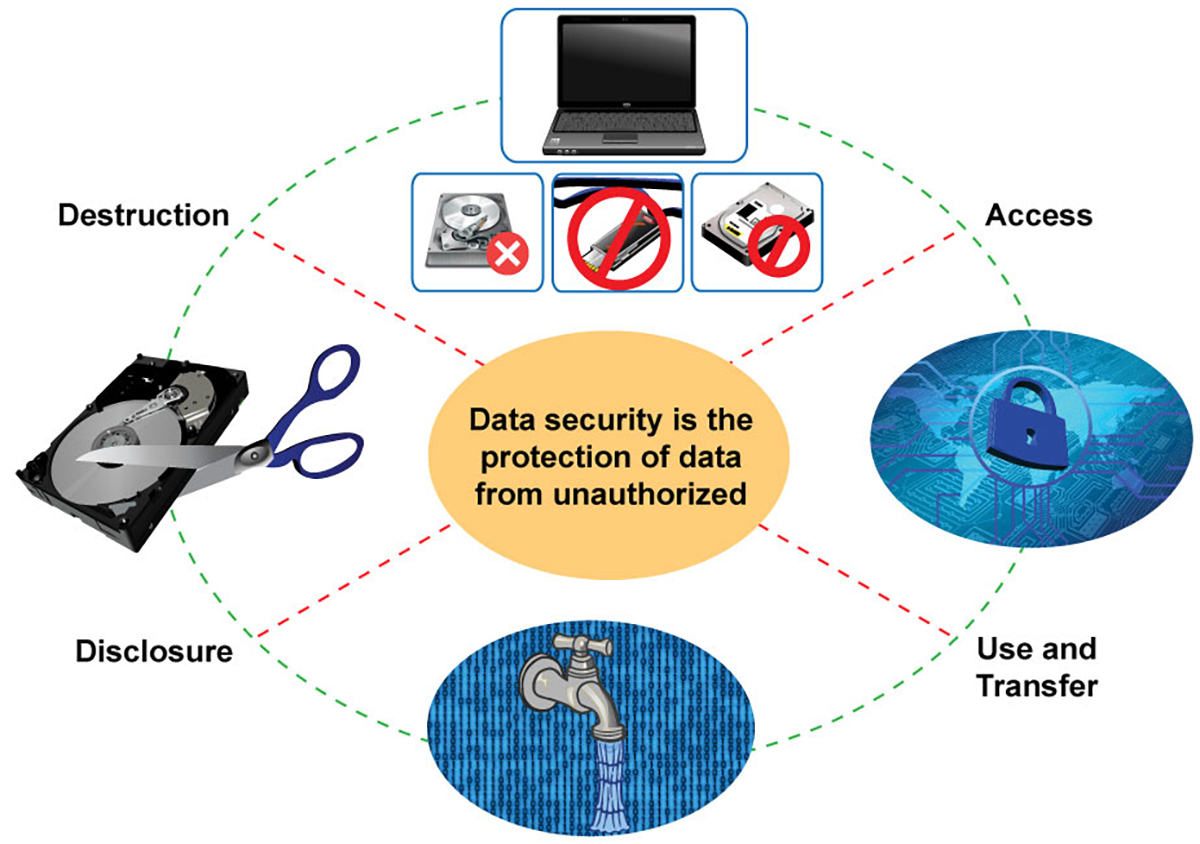The Effect of Effective Data Destruction on Cyber Security Risk Monitoring
The Effect of Effective Data Destruction on Cyber Security Risk Monitoring
Blog Article
The Necessary Nature of Data Damage in Upholding Computer Protection Solutions and Protecting Versus Unauthorized Access
In an era where information breaches and identity burglary are progressively prevalent, the value of reliable information devastation can not be overemphasized. Organizations should acknowledge that the failure to correctly take care of sensitive details poses not only lawful and economic dangers but likewise a prospective erosion of customer count on. Different techniques, from information cleaning to physical devastation, offer as crucial safeguards against unapproved accessibility. However, recognizing the ramifications of information devastation techniques and compliance with policies increases crucial inquiries concerning the adequacy of current methods and their lasting practicality despite developing threats.
Importance of Data Damage
In an increasingly digital globe, the value of information destruction can not be overstated. As organizations generate large quantities of sensitive info, the possible effects of failing to properly manage and get rid of of that data come to be progressively severe. Information violations, identity burglary, and corporate reconnaissance posture considerable threats, highlighting the necessity of effective data destruction methods.

Furthermore, as innovation advances, so also do the approaches through which malicious stars seek to manipulate delicate information. Organizations has to remain aggressive and attentive in their data devastation techniques to guard against these progressing risks. By focusing on information devastation, business not just safeguard their properties however also foster depend on among customers and stakeholders, demonstrating a dedication to responsible data administration and security methods.
Approaches of Effective Data Destruction
To ensure the complete and irreparable damage of sensitive information, organizations can utilize a range of reliable techniques tailored to their certain requirements. Among one of the most common techniques is data cleaning, which entails making use of specialized software to overwrite existing information several times, making healing essentially difficult. This is particularly useful for solid-state drives and hard drives, where standard deletion approaches are inadequate.
One more efficient method is degaussing, which makes use of strong electromagnetic fields to disrupt the magnetic domains on storage space media, providing the data irretrievable. This method is especially matched for magnetic storage space devices, such as tape drives and hard drives.
Physical destruction is likewise a practical choice, including the shredding, squashing, or incineration of storage gadgets. This approach assurances that information can not be recuperated, making it optimal for organizations handling very sensitive information.

Compliance With Information Protection Rules
Organizations have to not just focus on reliable information devastation approaches yet additionally ensure conformity with data defense regulations that control how delicate information is managed and disposed of. Sticking to these policies is important for preserving and guarding individual data client trust fund. Regulations such as the General Information Security Regulation (GDPR) in the European Union and the Health Insurance Portability and Responsibility Act (HIPAA) in the United States enforce stringent guidelines on data administration, that include demands for the safe disposal of sensitive info.
To achieve conformity, companies have to carry out detailed information destruction plans that straighten with these lawful frameworks. This consists of identifying information that requires destruction, establishing methods for safe methodsâEUR" such as shredding physical media or making use of software program that satisfies industry standards for information wipingâEUR" and preserving comprehensive documents of destruction activities. Normal audits needs to be carried out to make sure adherence to these policies and to determine any potential locations for renovation.
Failing to adhere to data protection laws can bring about substantial lawful implications, including significant penalties and damage to a company's track record. As a result, integrating compliance right into information damage techniques is not only a lawful responsibility however additionally a critical part of a durable information security method.
Consequences of Poor Data Handling
Poor information handling can lead to serious repercussions that prolong beyond instant operational obstacles. Organizations read the article might face considerable monetary losses because of data breaches, which often cause expensive removal initiatives, lawful fees, and regulative fines. These economic ramifications can impede and strain resources growth, ultimately affecting an organization's bottom line.
In addition, bad information handling can seriously damage an organization's credibility. Companions, customers, and stakeholders may lose count on in an entity that stops working to protect delicate info, bring about decreased client loyalty and possible loss of business opportunities. This erosion Visit This Link of trust can take years to restore, if it can be brought back in any way.
Additionally, companies might deal with lawful implications emerging from non-compliance with information security policies. Such offenses might lead to charges and investigations, intensifying the economic problem and more tarnishing the organization's photo.
In the realm of cybersecurity, insufficient data administration practices can create vulnerabilities that make systems more prone to unauthorized gain access to and cyberattacks. Ultimately, these consequences emphasize the crucial relevance of applying durable information dealing with procedures to protect sensitive information and keep organizational integrity.
Finest Practices for Secure Data Disposal


First of all, information should be identified according to its sensitivity. Sensitive info calls for much more strenuous disposal approaches, such as shredding physical documents and utilizing advanced software for electronic information wiping. site link Utilizing qualified information damage solutions ensures conformity with market laws and criteria.
Secondly, companies ought to apply a data disposal plan that mandates routine audits. This policy should describe the procedures for data retention and destruction, making certain that outdated data is gotten rid of immediately and securely. Educating employees on these procedures is vital to fostering a society of safety understanding.
Lastly, keeping in-depth documents of disposed information improves accountability and provides a clear audit trail. This documentation ought to consist of the sort of information damaged, the method used, and the day of disposal.
Verdict
In final thought, the vital of effective information damage is apparent in its function in enhancing computer system protection solutions and mitigating unapproved gain access to risks. Adopting robust techniques such as information wiping, degaussing, and physical damage, along with conformity with policies like GDPR and HIPAA, is essential for protecting sensitive information. Neglecting proper data disposal methods can result in severe consequences, including data violations and lawful effects. Executing ideal practices in secure data disposal ultimately strengthens organizational integrity and customer depend on.
In an age where information breaches and identity burglary are progressively prevalent, the value of reliable data damage can not be overemphasized. data destruction. Information violations, identity theft, and corporate espionage present significant hazards, highlighting the necessity of efficient data destruction practices
Compliance with guidelines such as GDPR and HIPAA requireds that companies carry out rigorous data protection actions, consisting of the safe damage of information at the end of its lifecycle.
By focusing on data damage, business not just shield their assets yet additionally foster trust amongst stakeholders and customers, showing a commitment to liable information management and protection methods.
Organizations must not just concentrate on reliable data damage approaches however also ensure compliance with information protection policies that control just how sensitive info is handled and disposed of.
Report this page